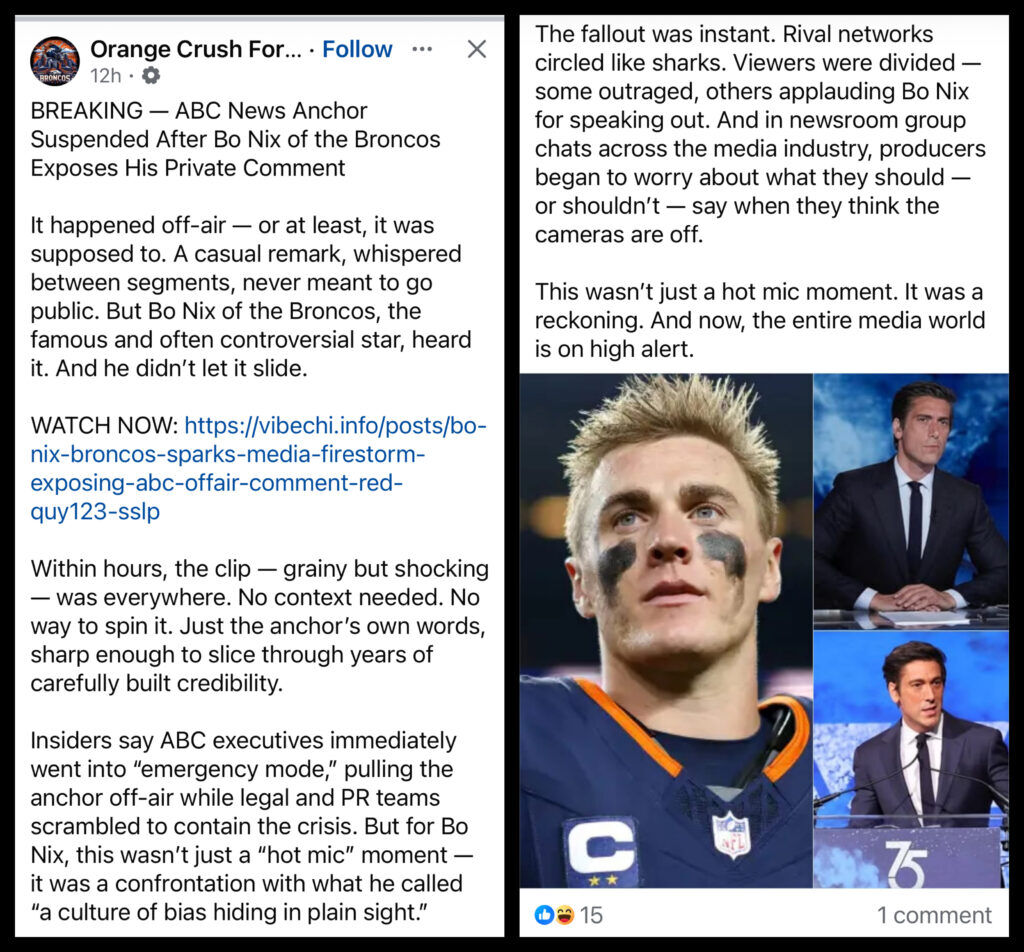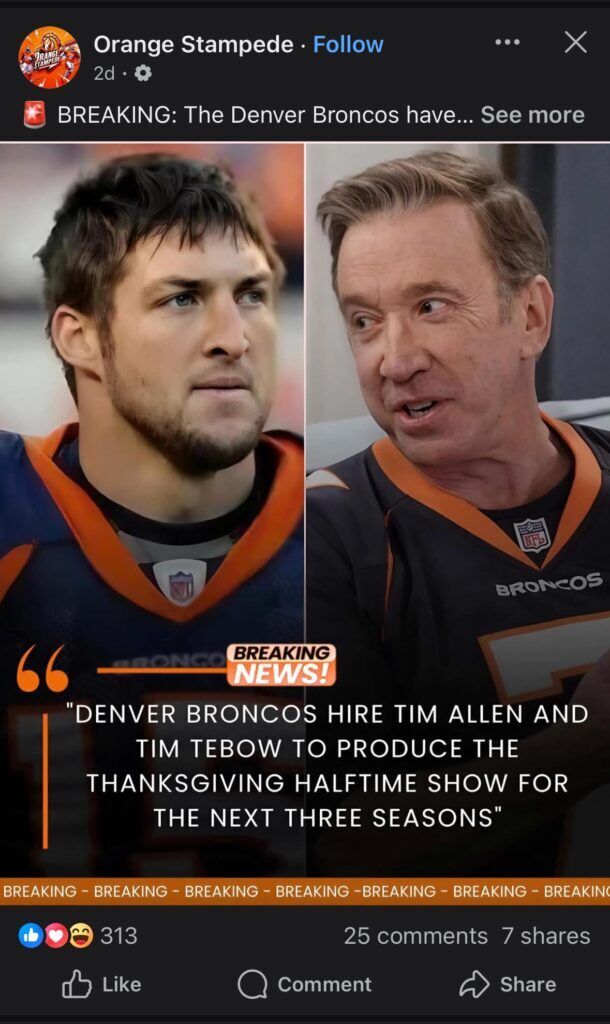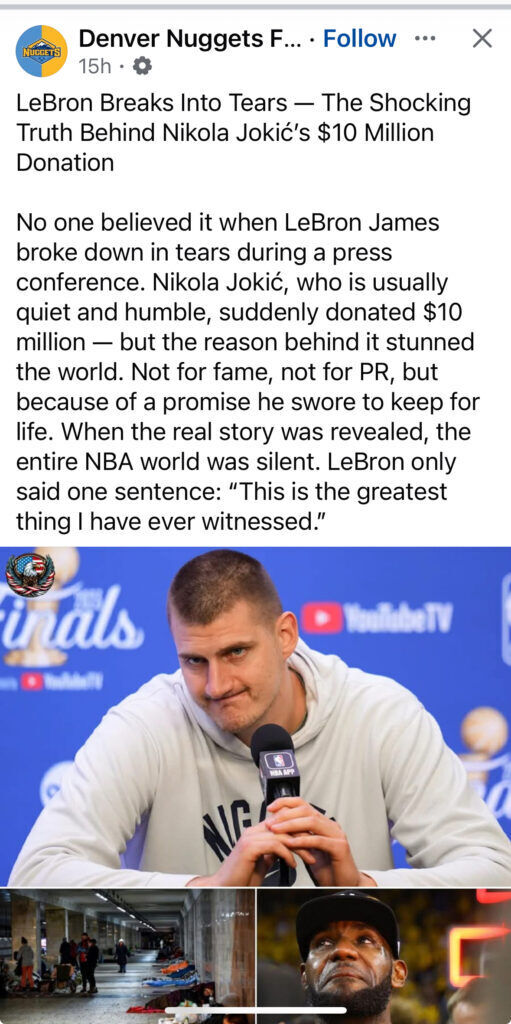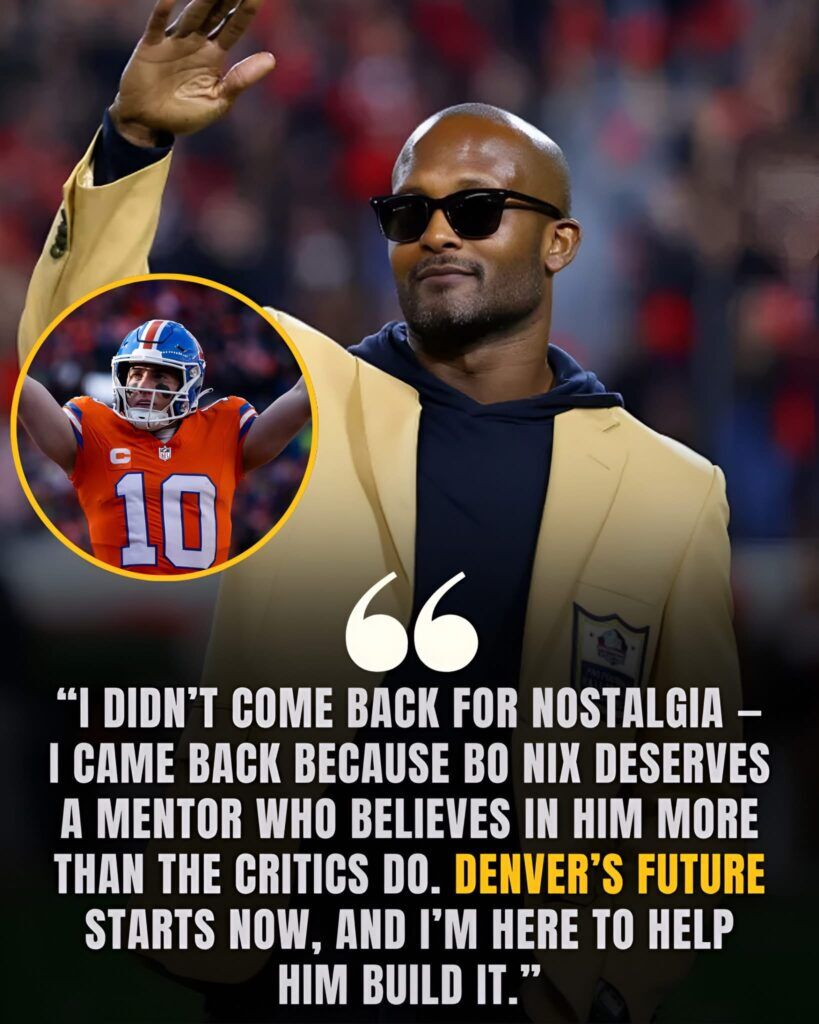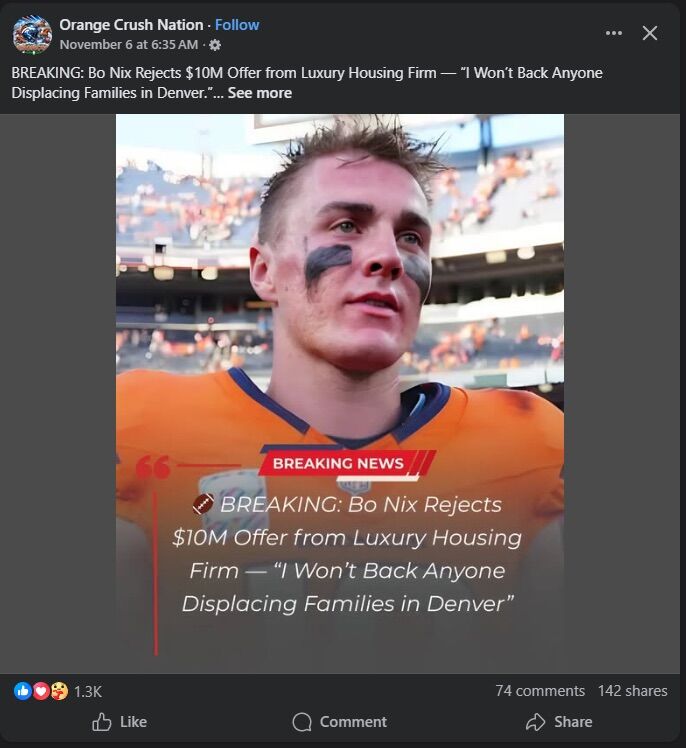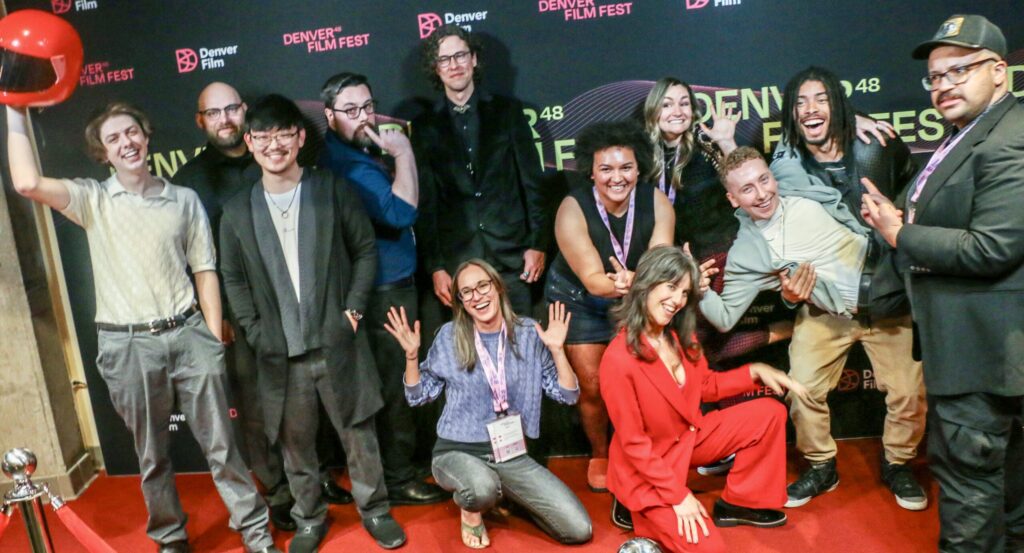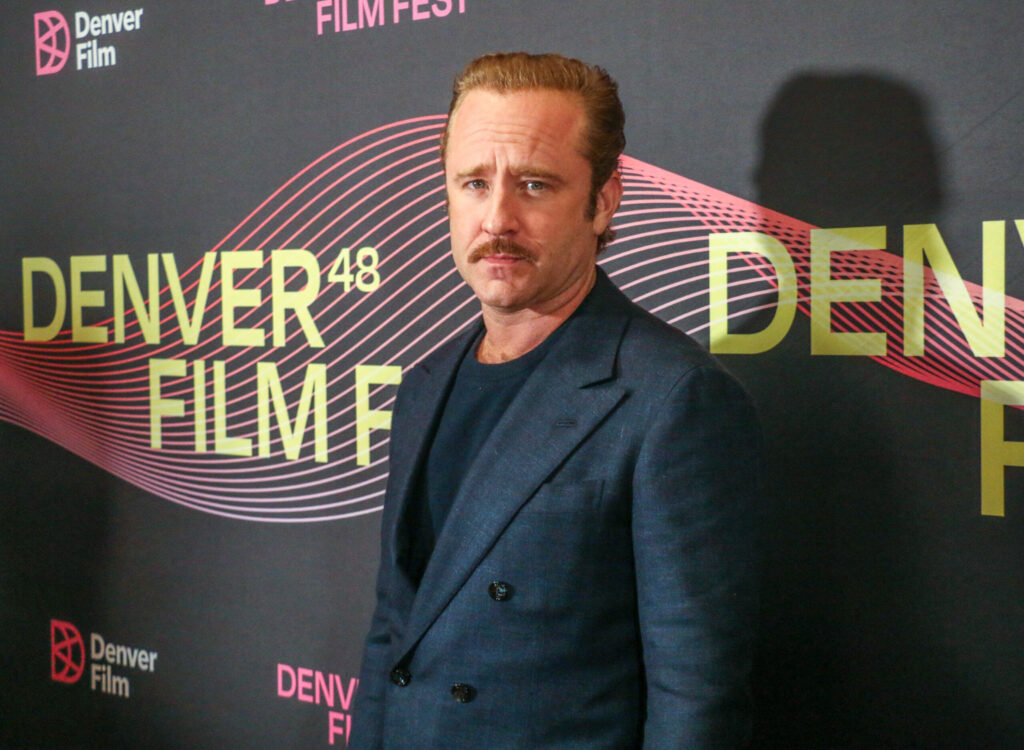This just in: Facebook’s breaking ‘news’ is a total head fake
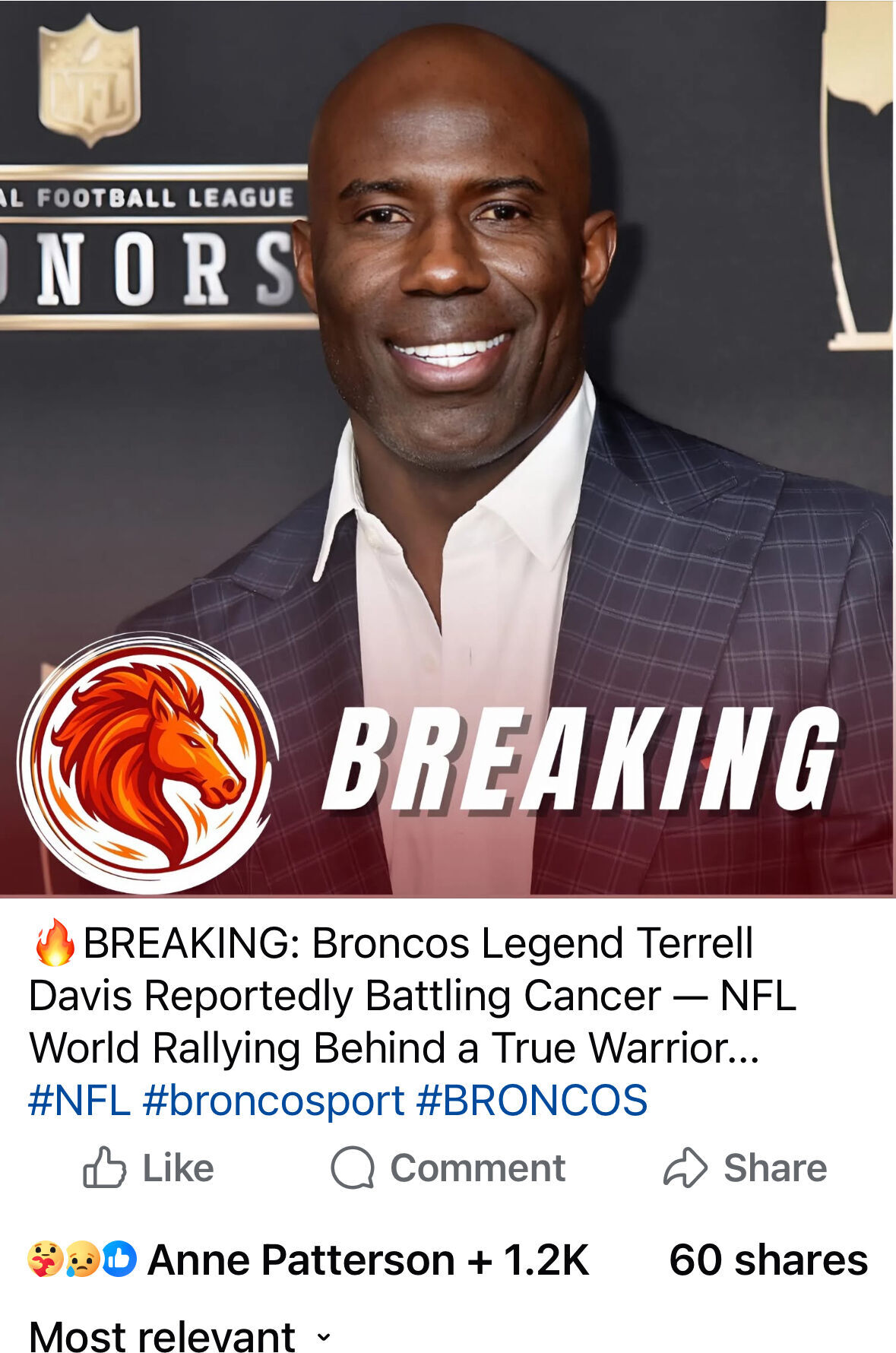
Meta’s bots exploit your emotional triggers and your regional sports heroes to keep you engaged – and make it millions in revenue
For a guy who rarely says much of anything, Bo Nix sure does talk a lot on social media.
One minute, the Denver Broncos’ star QB is purported to be saying he’ll boycott the NFL’s upcoming Pride Week games. His principles, he says, are more important to him than the Broncos’ march to the playoffs.
The next, Nix is announcing he has terminated all endorsement ties with Amazon over billionaire founder Jeff Bezos’ support for Donald Trump. “Wake up, Jeff!” Nix is said to have said.
Careful, there, Bo. You’re going to land yourself on the I.R. with a case of ideological whiplash.
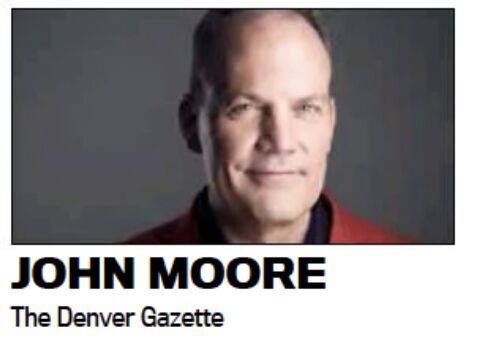
Wait, now a Broncos Facebook fan page is reporting a tense, nationally televised exchange between Nix and “The View” co-host Whoopi Goldberg, who had the temerity to say of the second coming of John Elway: “He’s just a football player!” (How DARE she?)
According to the Facebook post breaking this shocking news, “The Broncos’ star wide receiver looked straight into the camera and sent shockwaves through every living room in America” when he told Goldberg: “You can mock my game, my faith or my voice, but I’ll still stand taller than your insults.”
The moment was declared by this post to be “a national wake-up call.” (Not sure for whom. Or when Nix became a wide receiver.)
Oh, look, now here’s something nice: Nix is also building a sanctuary for addicts and lost kids. He’s “funding every brick himself” and calling it “Field of Grace” – “a place where therapy meets guitars.”
Busy week for Bo. (Good thing this is a bye week for the Broncos.)
Only problem is … it’s all total bull(bleep). Every last word. Fake news made up by fake Facebook pages with one insidious goal in mind: To draw you and millions of other gullibles into spending more time actively engaging on Meta’s social platforms. It’s a toxic social-media phenomenon – and it’s working. Every one of those absurd Facebook posts has drawn hundreds or even thousands of likes, shares and comments from fooled users expressing solidarity/disgust with the Broncos’ suddenly politically active quarterback.
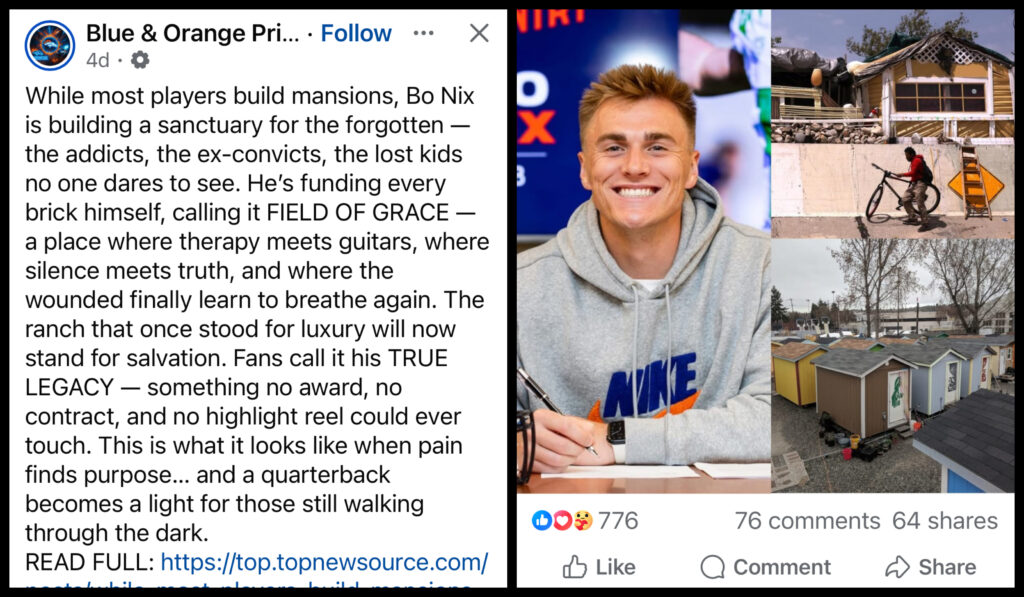
The bottom line: These fake posts are engineered for virality by provoking your praise and outrage. And the more time you spend going down these manufactured rabbit holes, the more money Meta makes from its advertisers.
And poor Bo Nix isn’t the only target. These fraudsters will invoke the name of anyone Meta’s algorithm believes will draw the most attention in your area of the country. In Denver, that means you see a preponderance of posts about Peyton Manning – who, if Facebook is to be believed, is a regular rescuer of drowning teenagers in every flood-plagued corner of the country. Who recently calmed a stranger’s inconsolably crying baby on a cross-country flight. Who laid his game ball from the 2007 Super Bowl at the grave of his high-school coach in New Orleans. And, oh the coup de gras: Who just adopted an orphaned girl named Lily after her parents died.
None of it happened. But the comments – many generated by fake accounts themselves that keep the virality going – indicate that many (many) Facebook users believe they are real.
How can you spot a fake? By using your critical thinking skills. Ask questions, like:
• Would someone really build a sanctuary for both addicts and lost kids … in the same place? (If they do, please call social services.)
• Does the NFL even have designated Pride Week games? (No.)
• Wait, would Bo Nix even make an appearance on “The View” during the regular season? (No.)
• And why does that Bezos post spell Trump’s name “T.r.u.m.p.” (So it doesn’t get flagged and closely scrutinized.)
• Does a Facebook fan group called “Orange Stampede” sound like a credible repository of real news? (No.)
Here’s a fact: The Broncos remain the most competitive news beat in all of Colorado journalism. It’s rare when one legit reporter owns a scoop for more than 15 minutes. So when you see a post announcing that Von Miller and/or Champ Bailey are coming out of retirement for the Broncos’ Super Bowl push, ask yourself: Has any legit media outlet also reported this story? (Not to mention: Isn’t Miller still actively playing for the Washington Commanders?)
This cloud of internet dust is reminiscent of the entertaining but equally dubious “yellow journalism” era that drove newspaper sales more than a century ago. But readers back then were mostly in on the joke. With no TV, radio, or cell phones yet, newspapers were America’s primary source of entertainment, and readers pretty much understood it was all a con for their amusement.
These outrageous Facebook posts might seem like harmless nonsense until you see the post announcing that Broncos legend Terrell Davis is battling cancer. (By all accounts, he’s not.) That picture is certainly of the great T.D. himself. The huge word “BREAKING” makes it look like the news is coming from a legit media outlet. But, wait a minute: That AI-generated “Broncos” logo next to Davis’ name looks more like a lion (king) than a horse. It’s bunk.
How targeted is this scam? The post that Colorado Facebook users are seeing of Nikola Jokic turning down a huge midseason offer to jump from the Nuggets to the Lakers (a contractual impossibility) is also being seen in Minnesota – only with Anthony Edwards’ name and face in Jokic’s place.
While the news is fake, the lives these posts toy with are very real. Imagine Davis or a member of his family constantly being consoled by those who saw and believed that fake cancer post.
For the most part, the affected players and their teams (like the Broncos for this story) don’t want to give these fake posts any more oxygen, so they rarely comment on any of it – even if just to say, “Liars, liars your pants are on fires!”
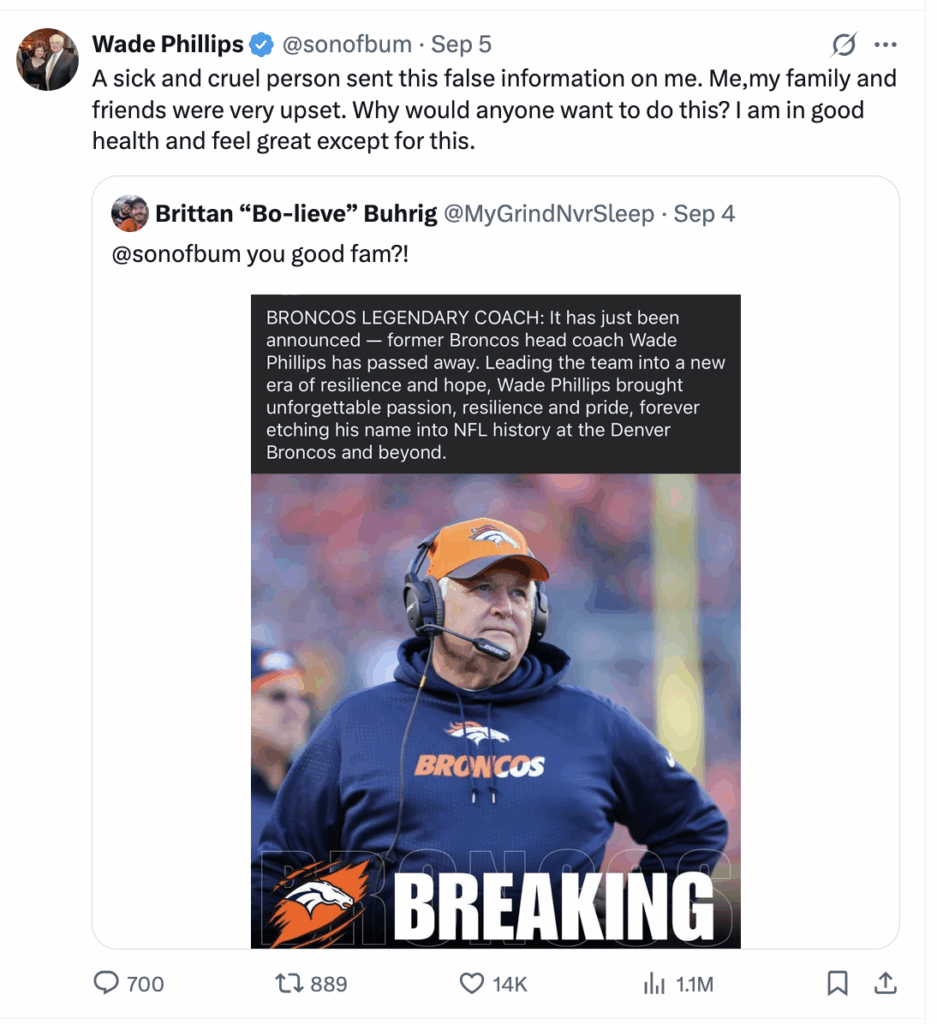
One exception is Wade Phillips. Some might have been surprised to see the former Broncos head coach in person at the University of Colorado’s football game against Houston on Sept. 12. Just a few days before, a “Breaking News” Facebook post announced that Phillips had died at age 78.
But unlike many silent targets, Phillips proactively took to X and proclaimed himself very much alive. “A sick and cruel person sent this false information on me,” Phillips wrote, “and me, my family and friends were very upset. Why would anyone want to do this?”
(I can tell you, Wade. Because 1.1 million people engaged with that fake post.)
So what is behind all of this – and, more important, who is behind it? The answers might surprise you. Might not.
It all comes down, of course, to money.
Facebook advertisers, like all others on the internet, pay rates that are based on engagement – clicks, likes, shares and comments. The higher the engagement on a given social media platform, the greater the visibility and value of placing ads on those sites. Fake news revs the financial engine by creating “artificial virality.” These fake accounts, in short, draw in real but gullible users, who are then exposed to more (and more expensive) ads.
Meta officials’ repeated assertions that the company actively combats bots and disinformation have repeatedly proven to be, pardon the expression, fake news. Both by basic observation and by investigation. Several media reports have said the company’s own internal documents reveal an ongoing tolerance for these kinds of activities “when they drive profits.”
Here’s how industry experts say it works:
Innocuously named (and short-lived) Facebook group pages like, for example, “Denver Broncos Fans” are automated profiles – most of them originating from Russia and the Philippines. They are programmed to post sensational, false or divisive content – often by spreading false conspiracy theories, celebrity hoaxes or political misinformation designed to provoke your praise or outrage.
There is an actual term for this in the biz. It’s called “Coordinated Inauthentic Behavior,” or CIB. Bots create thousands of fake profiles that like, share, comment, and repost the same CIB content en masse. This catches the attention of Meta’s algorithm, which then promotes it as “trending” or “popular” – and that pushes the fake news into more and more real users’ real feeds.
According to one report, a single “bot farm” can feed disinformation into as many as 14,000 fake Facebook pages at the same time.
“It feels like a lifetime ago when Meta actually employed a third-party fact-checking program, which it actually ended less than a year ago. (And why would they police bad info now, when bad info is making the company money?”)
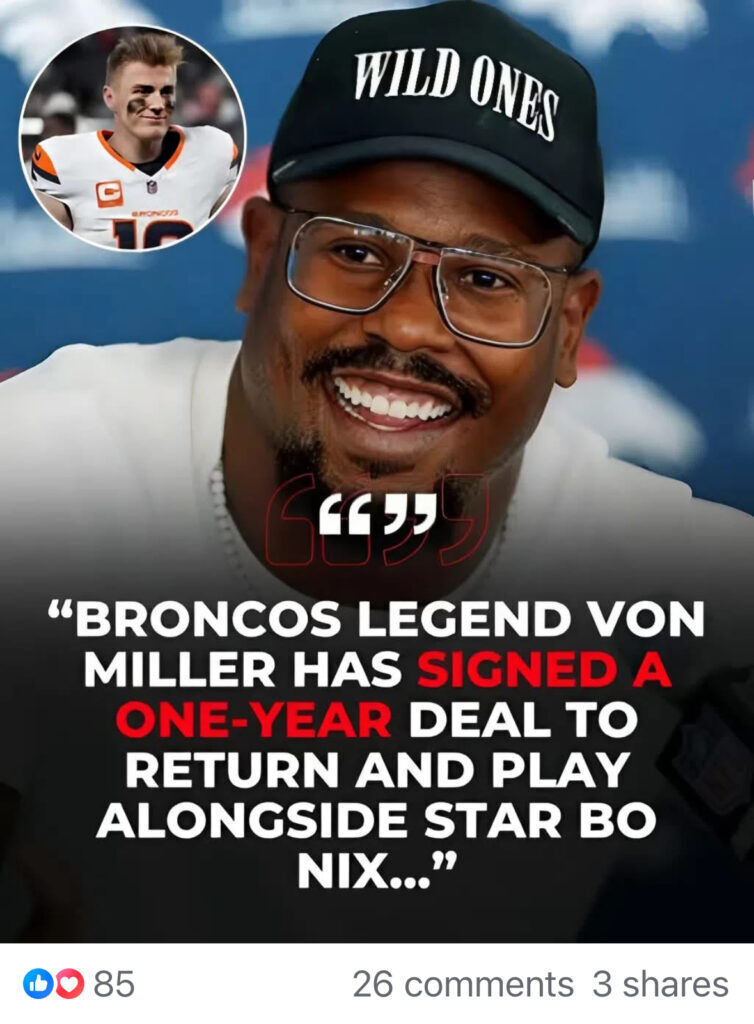
Fake news hooks genuine users, who often react emotionally to it, either by celebrating or condemning its content. This creates what is called “a feedback loop”: More interactions mean more algorithmic promotion, more time spent on the platform, and higher ad exposure. Studies have shown that fake news can generate 20 times more shares than real news, turning one bot’s initial spark into widespread organic traffic.
How does that turn into money for Meta? Indirectly but hugely. The more exposure an ad gets, the more Meta charges the advertiser. Last year, Meta made $161 billion on advertising placed on its three platforms – Facebook, Instagram and WhatsApp.
And here’s where it gets downright deplorable. According to a bombshell new Reuters investigation released Nov. 6, fully 10% of Meta’s ad revenue – up to $16 billion a year – comes from publishing ads that Meta knows to be outright scams or for banned products. This comes from a review of Meta’s own internal documents.
According to Reuters, once at least 500 users report an ad as fake, Meta will slap the advertiser with fines and remove the ad. But think about it: That means Meta makes even more revenue on ads that it publishes that it knows to be fake.

These ads – for services that are fake or otherwise – appear, of course, alongside our aforementioned fake news posts, like the one claiming the Broncos would be honoring the memory of Charlie Kirk by inviting fans down to explore all private areas of its headquarters for three days. How that might honor Kirk was never explained in the post, but hundreds of commenters (real or otherwise) praised the Broncos for the gesture.
Noise like that generates massive organic traffic.
The experts’ advice: Do not engage, not even to debunk a post as fake news. If you ever do engage with any of them, you might as well be putting out a welcome mat. Because you have just algorithmically invited that fake page and others like it into your feed until you block every last one as you would an annoying spam call.
For me? Sadly, engaging with many of these fake posts as research for this column has pretty much set in stone my Facebook feed experience for the rest of my natural lifetime. I’m just never getting away from posts like the one claiming Dallas Cowboys owner Jerry Jones nearly convinced Broncos head coach Sean Payton to jump ship to coach the Cowboys in the days before the Broncos clobbered the Cowboys on Oct. 26.
Of course, we would all like to believe we live in a world where a problem like this one never actually becomes a full-blown problem like this because we want to believe that we are, deep down, collectively smarter than that. But we’re not.
The reason fake news is a problem in America is because people believe fake news.
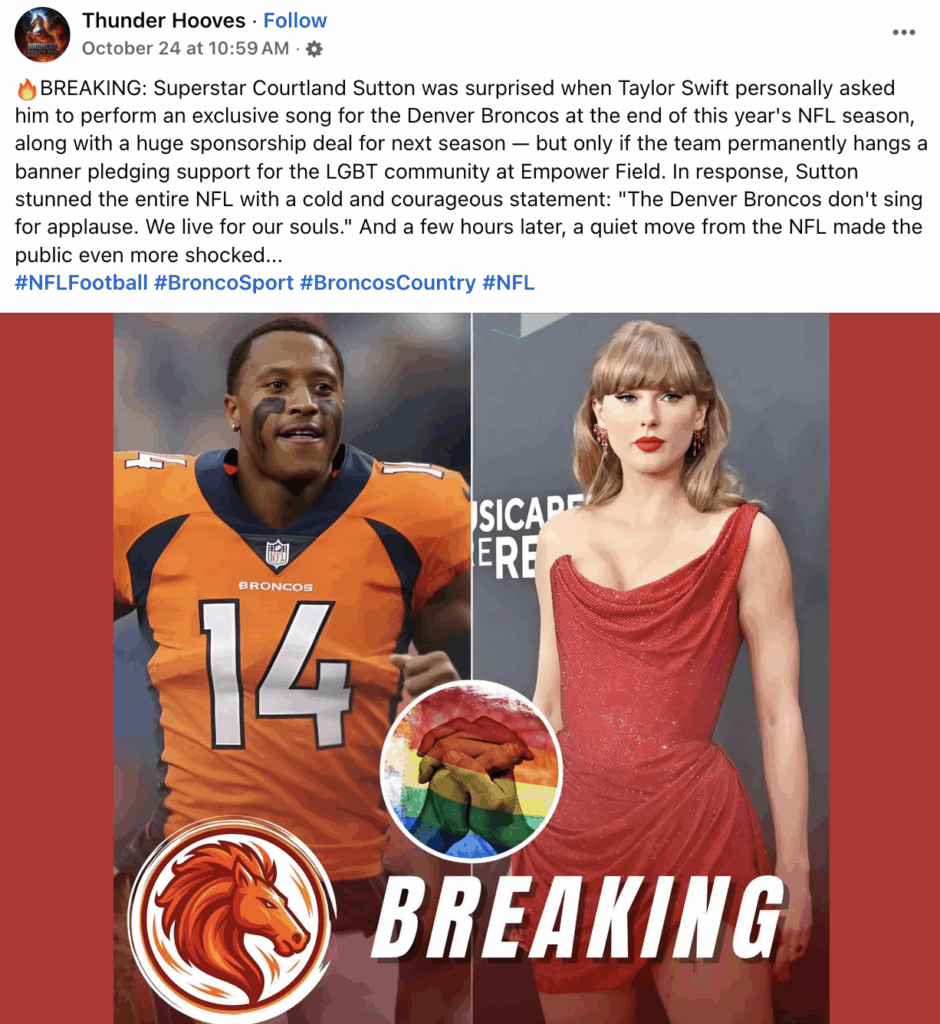
The optimist in me believes there will be a tipping point. A point when a Broncos fan sees a post that claims Taylor Swift just approached Broncos receiver Courtland Sutton (not owner Greg Penner!) with a promise to perform an original song at the team’s final home game – but only if the Broncos hang a permanent banner at Empower Field pledging support for the LGBT community. I want to live in a world where people would just know that, if Taylor Swift were to ever make an offer like that, she would not make it to a player but rather to an actual team official. And would just know that, in 2025, the quickest way to light a fake rage fire would be to invoke the NFL, Taylor Swift and the queer community all at once.
I want to live in a world where people recognize that nothing triggers human emotions more easily than heroism, tragedy, controversy or culture wars. So they would know they are being played – and not believe it.
Ironically, the day Facebook readers do start to get wise(r) and collectively question whether what they are being spoon-fed is true or crap, chances are they will become cynical, and less inclined to trust any news they see anywhere. And that would be the greatest scourge of all.
But that might be what our collective enemies have had in mind all along.
John Moore is the Denver Gazette’s Senior Arts Journalist. In compiling this report, he reviewed several published news reports. Email him at john.moore@denvergazette.com.
